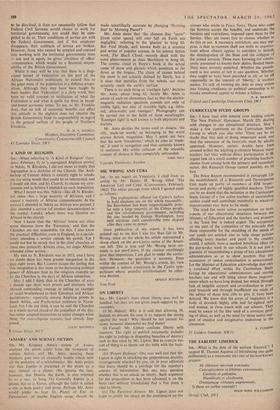A KIND OF RELIGION
SIR,—When referring in 'A Kind of Religion' (Spec- tator, February 1), to 'a segregated Anglican service' in Ndola, N. Rhodesia, I did not mean to imply that
segregation is a doctrine of the Church, The Arch- bishop of Central Africa is entirely right to rebuke me for using words that could be so interpreted, and I would ask him, and his Church, to excuse my care- lessness and to believe T intended no such imputation.
What I meant was this. Ndola—like all N. Rhodes- ian cities—has a large majority of Africans, and 1 expect a majority of African communicants. At the service I attended in Ndola no African was present. I also attended a service (of another denomination) in the capital, Lusaka, where there was likewise no African in the church.
Now I know that the 'African' towns are often some distance from the 'European,' and that the Churches are not responsible for this. I also know the practical difficulties, even in England, to a parish- ioner attending a service outside his parish. Yet I could not but be struck that in the chief churches of these two primarily African cities, no single African attended either service.
My visit to N. Rhodesia was in 1955, and 1 have no doubt there has been greater integration in the past eight years. But 1 cannot escape the feeling that this integration is due more to the increasing political power of Africans than to the religious example set by the Churches in the days of African subjection.
May I add I think that in the Churches of even a decade ago there were priests and ministers who showed outstanding courage in setting an example of racial brotherhood to their European and African parishioners : especially among Anglican priests in South Africa, and Presbyterian ministers in Nyasa- land. Yet 1 do not think it can be said the Churches as a whole moved ahead of the prejudices of the day, but rather adapted themselves to social changes when these, for non-religious reasons, had already hap- pened.
COLIN MACINNES
9 Grape Street, WC'?














































 Previous page
Previous page